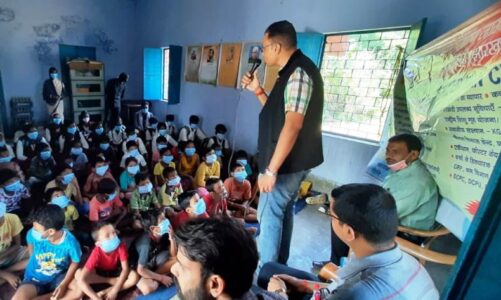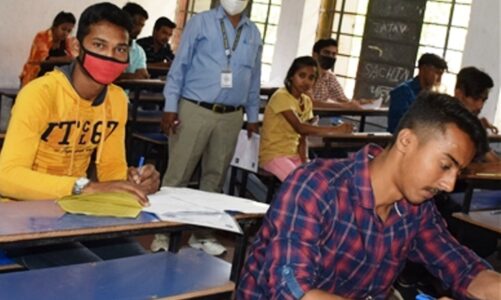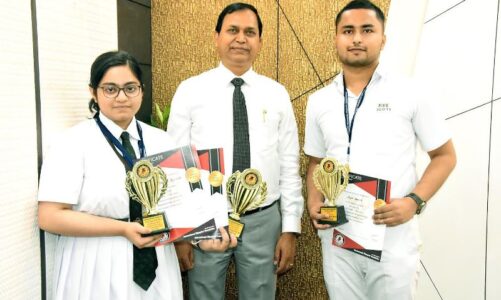Prime Minister, Narendra Modi addressed webinar on positive impact of Union Budget 2022 on the education and skill sectors. Concerned Union Ministers, key stakeholders from education, skill development, science, technology and research were present on the occasion.
Prime Minister started by emphasizing the importance of the young generation in the process of nation building. He said “Empowering our youth who are future nation builder, is empowering India’s future”.
In conclusion, the Prime Minister explained how recent changes in the budgetary process are turning budget as a tool of transformation. He asked the stakeholders to implement the budget provisions seamlessly on the ground. He said that by advancing budget by one month in recent times, it is being ensured that when it is implemented from first April, all preparation and discussion is already undertaken. He asked the stakeholders to ensure optimum outcome from the budget provisions. “In the context of Azadi Ka Amrit Mahotsav and National Education, this is the first budget, which we want to implement quickly for laying down the foundation of the Amrit Kaal”, he continued “budget is not just an account of statistics, budget, if implemented properly, can bring great transformation even with limited resources”, he concluded.
Click the link to read the full text of PM’s address at webinar on positive impact of Union Budget 2022 on the education and skill sector: https://pib.gov.in/PressReleasePage.aspx?PRID=1800024
The webinar was part of the new practice of discussion and dialogue with the stakeholders before and after the budget. The objective is to brainstorm with experts from the public and private sectors, academia and industry and identify strategies on how best to move forward towards implementation of various issues under different sectors. The webinar had sessions on different themes of relevance and witnessed participation of government officials of various ministries and state governments, industry representatives, skill development organizations, educationists, students and other experts.
The themes identified for the webinar are:
1. Digital University: Making World Class Higher Education Accessible for All.
The session was co-chaired by Shri K. Sanjay Murthy, Secretary, Higher Education and Shri K. Rajaraman, Secretary, Department of Telecom. Broader aspects of establishing a digital university, as announced in the Union Budget 2022 were discussed. This included creation of a comprehensive EduTech ecosystem in PPP mode, digital platform, content creation, effective digital pedagogy, robust faculty training, virtual labs and assessment of digital teaching-learning.
The panelists emphasized on the need for Multi-lingual, accessible Learning Management System, creation of engaging, immersive learning experiences, linking peer learners to create strong learning communities and synchronised, experiential learning by blending online education with physical mode (phy-igital).
The Digital University will enhance access to quality higher education which will be particularly useful in rural/remote/tribal areas. This university can bridge the gaps in faculty development, enrollment in SEDGs, employability enhancing skills, quality learning material in regional languages, formal & non-formal (Recognizing Prior Learning) etc.
2. The Digital Teacher: Creating quality e-content and Virtual Labs for Inclusivity, Better Learning Outcomes and Skilling
Mr. A.P. Sawhney, Secretary MEITY and Ms. Anita Karwal, Secretary DoSEL co-chaired the webinar session. Mr. Terry Durnnian, UNICEF, and Dr. Shabnam Sinha, World Bank were the panelists who discussed in detail about the current situation on learning outcomes in the COVID times, and covered multiple aspects of digital education from digital teachers, quality content creation, to empowering teachers using digital tools. They suggested strategies to address the challenges and ways for leveraging ‘Digital Teachers’ to effectively prioritize and implement the national priorities of imparting education to all.
3. Widening Reach of One Class One Channel: Reaching Quality Digital Education to the Farthest Corner
The session was co-chaired by Prof. Nageshwar Rao, VC, IGNOU, Chairperson and Dr T. P. Singh, DG-BISAG-N. Dr T. P. Singh presented an overview of the preparations made so far on the technical set-up required for setting up of 200 educational channels. Various challenges and opportunities in widening the reach of One Class-One Channel were discussed including possible innovations in pedagogy, achieving greater inclusion and the techno-managerial aspects of this mission. A case study of Vande Gujarat Channels and it’s working was also presented during the session.
4. India Specific Knowledge in Urban Planning and Design
The session was chaired by Sh. Manoj Joshi, Secretary, Ministry of Housing and Urban Affairs. The session deliberated on various emerging trends in urban planning with focus on integrating India Specific Knowledge in Urban Planning and Design. Experts discussed that with greater role of technology and increased impetus on achieving socio-economic objectives through urban planning, there is a need to revisit the curriculum of planning courses in the country. Speakers also suggested creating repository of good practices and provide increased focus on capacity building and skill development.
5. Towards Fostering Stronger Industry-Skill Linkage
The session was co-chaired by Secretary, MoSDE Shri Rajesh Aggrawal , DG Tourism Shri G. Kamala Vardhana Rao and Secretary DPIIT Shri Anurag Jain. Secretary, MSDE highlighted the importance of soft skills and entrepreneurial mindset for youth and the industry and called for the need for greater synergy between school education, higher education, and the skilling ecosystem. Secretary of DPIIT emphasized on the need for dynamic skilling environment, exposure to industry requirements and NSQF alignment with industry needs. DG, Tourism shared the new opportunities in the sector which are necessitating skill development to increase employment prospects.
6. Developing Educational Institutions in GIFT City
The Session was chaired by Shri Injeti Srinivas, Chairman International Financial Services Centre Authority (IFSCA) and Co-chaired by Shri Sudhir Mankad, Chairman GIFT City.
The discussion revolved around the broad areas viz. criteria, procedural, governance and legal aspects for establishment of foreign institutions in GIFT City. The panel discussed on these issues and proposed an action plan and strategies to take it forward. It was also pointed out that for long term sustainability of this futuristic education model, a robust legal and governance framework is required.
7. Strengthening Industry-Skill Linkage in AVGC
The session was co-chaired by Secretary Ministry of Information and Broadcasting Shri Apurva Chandra and Additional Secretary, Ministry of Skill Development and Entrepreneurship Shri Atul Tiwari.
In his opening remarks, Shri Apurva Chandra said that the announcement on AVGC Task Force in the budget speech is a momentous event which recognizes the importance of the AVGC sector and the role it plays in creating employment in the country. Shri Atul Tiwari gave a brief roundup of the activities being undertaken by Ministry of Skill including PM Kaushal Vikas Yojana, both short and long term training under ITIs and PM Kaushal Kendra Centers et al. Shri Tiwari assured the audience of any support that may be required for skilling in the sector.
Experts from the sector weighed in with their thoughts on education and skilling around the AVGC sector. Need for skills for this sector at an early age in schools, the future growth and employment potential, and career options in the sector were also discussed.
In his remarks during the concluding session of the webinar, Minister of State for Education Dr. Subhas Sarkar appreciated the presentations of all the seven sub themes. He said that the webinar aims to develop a comprehensive strategy for implementing various budget announcements. On one hand, it allows for a stock-taking of the ongoing reforms and developments in the sector, while on the other hand, it centralises the best minds from varied stakeholder groups to deliberate on the best and most effective way forward. He further stated that thorough the webinar we have flagged priorities and areas requiring synergy between stakeholders and laid down the best possible action plan for the future. He congratulated all participants and experts on this effort.
Making his observations, Shri Rajeev Chandrasekhar, Minister of State for Skill Development and Entrepreneurship stressed that the endeavors under Skill India need to be integrated with education, ensuring students can easily access the skill ecosystem. Stronger employment and entrepreneurship outcomes need to be the by-product of our skill initiatives synergizing with the dynamic demands of the rapidly changing industries- local and global, he added. He further said that we should be able to boost the skill development framework with the launch of DESH Stack e-portal, ensuring India becomes a leader in word-class technology.





